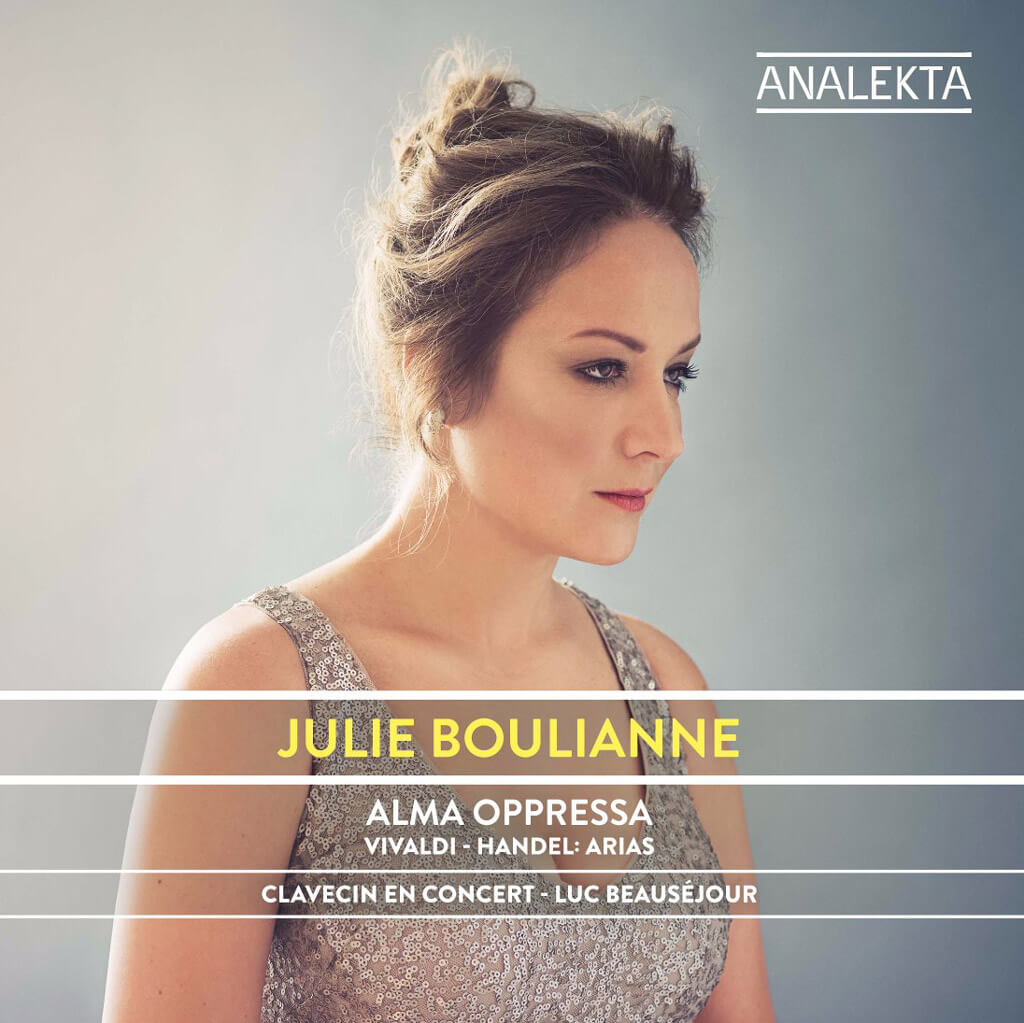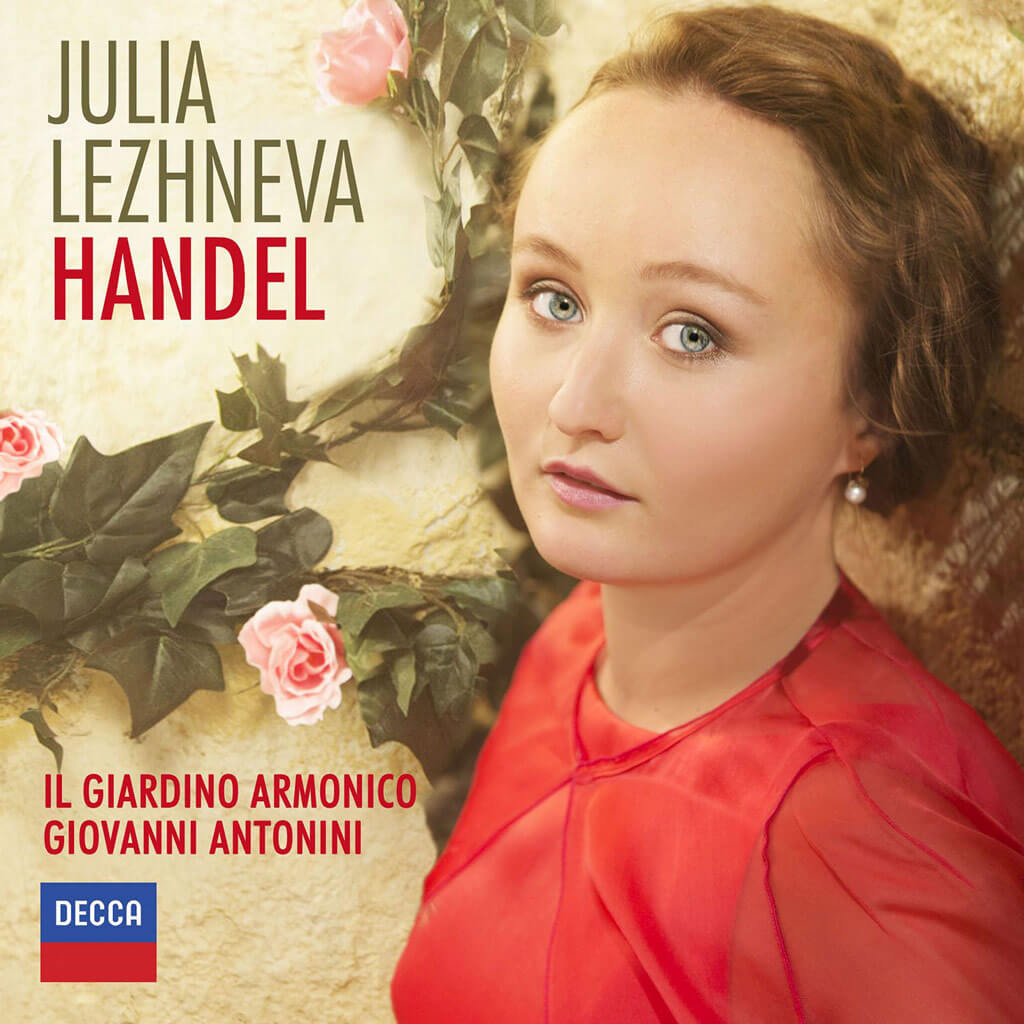
Canadian singer Julie Boulianne has quickly become an international star. She performs regularly at the Met, at the Royal Opera House, Covent Garden and throughout Europe. She has an extraordinarily wide repertoire from Bach to Adès, and in this, her latest recording, she shows us what she can do with Vivaldi and Handel. For this CD, she is joined by long-time collaborators, harpsichordist Luc Beauséjour and his small period instrument group, Ensemble Clavecin en Concert. Although much of the music on this CD is pretty obscure, it is performed with enthusiasm and expertise, and in Boulianne’s case, with an extraordinary beauty of sound.
The CD is comprised of three Vivaldi arias and six by Handel. There are also two Vivaldi Sinfonias or opera overtures, and an excerpt from the overture to Handel’s opera Lotario. None of the instrumental music is particularly memorable, but it helps to break up the succession of vocal numbers.
Boulianne is absolutely superb in her command of the numerous up-tempo melismatic passages in the music of both Vivaldi and Handel. The beauty of her voice is even more impressive, from the lowest register to the very top of her range. In the aria “Alma oppressa” (a soul oppressed) from Vivaldi’s La fida ninfa, Boulianne is in total command. The music is florid, with wide leaps and surprisingly chromatic passages; Boulianne and the ensemble meet every challenge. Their performance of the aria “Sovvente il sole” (from Vivaldi’s Andromeda liberata) — “the sun shines more brightly and pleasantly when it has previously been obscured by a dark cloud” — with its long lyrical lines and important violin obbligato is equally impressive.

Russian soprano Julia Lezhneva, who has become a specialist in Eighteenth Century music and has already made many recordings for Decca, concentrates on the music of Handel on this CD. Taking note of the fact that Lezhneva is a soprano and Boulianne a mezzo-soprano — the two singers could hardly be more different. While Boulianne takes great care over correct ornamentation and other niceties of historically informed performance, she aims for a beautiful sound in everything she does. Lezhneva, on the other hand, while often dazzling in her virtuoso passage work, cultivates a sound very much like a boy soprano. Indeed, she seems to like to show off her vibratoless sound on long held notes. It may come down to a matter of taste: either you like Lezhneva’s sound or you don’t. Personally, I prefer Boulianne’s idea of what a baroque vocal sound ought to be.
That said, there is no doubt that Lezhneva is an exciting performer. She often tears into the rapid passage work like a woman possessed. Just check out the two fast and furious arias from Il Trionfo del Tempo e del Disinganno. Lezhneva’s Italian is often incomprehensible, but she certainly generates excitement in her fearless approach. Il Giardino Armonico’s ferociously intense playing is equally fearless.
Interestingly, there is one instance of repertoire overlap in the two recordings. Handel’s “Lascia ch’io pianga” from his opera Rinaldo is featured on the Boulianne recording, and another version of it — Handel often borrowed from himself — the aria “Lascia la spina” from the oratorio Il Trionfo del Tempo a del Disinganno, appears on the Lezhneva CD. Both are fine, deeply felt performances, but again, I prefer the unique richness of sound produced by Boulianne.
One curious difference between the two recordings: both conductors use harpsichords to lead the continuo group but while Beauséjour opts for an archlute as a fretted continuo partner, Antonini chooses the larger theorbo. Whether it is to the credit of the conductor or the engineers, the theorbo has an appealing and important up front presence on the Decca recording.
For more RECORD KEEPING, see HERE.
#LUDWIGVAN
- SCRUTINY | TSO Lets Berlioz Do The Talking In Season Opener - September 21, 2018
- RECORD KEEPING | Even Yannick Nézet-Séguin Can’t Make Us Love Mozart’s La Clemenza di Tito - September 6, 2018
- RECORD KEEPING | Giovanna d’Arco With Anna Netrebko Explains Why The Best Operas Survive - August 30, 2018



